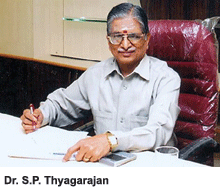University and college lecturers in the south-eastern seaboard state of Tamil Nadu (pop: 62.1million) have received a rude shock with higher education institutions in the state beginning to insist upon the new minimum faculty qualifications prescribed by the Delhi-based University Grants Commission (UGC) — the supervisory body for all non-technical higher education countrywide. Until now, colleges had no qualms about appointing faculty with minimum postgraduate qualifi-cations to teach undergrad and often postgrad programmes, given the widespread shortage of well-qualified teachers across the country.
But under the new minimum qualification regulations, newly appointed assistant professors (entry grade) are required to pass the National Eligibility Test (NET) or State-level Eligibility Test (SLET). Alternatively, they should have a Ph D to teach in undergrad colleges. The new regulations also apply to serving faculty and exemptions will be granted only on a case-to-case basis depending on when these teachers were appointed and the minimum qualification require-ment at the time of their appointment.
Unsurprisingly there’s a flood of protest from teachers’ associations of Tamil Nadu’s 1,234 arts and science colleges. Over 50 percent of the 500,000 faculty in arts and science colleges in the state don’t possess the requisite qualifications and are being forced to write NET/SLET or complete their Ph D theses by the start of the next academic year 2011-12. Moreover University of Madras has warned the managements of its 200 affiliated colleges that affiliation will be withdrawn if they employ under-qualified faculty for arts and science programmes.
 Clearly, with the Sixth Pay Commission having hiked faculty pay by an average 30-40 percent earlier this year, UGC has embarked on a belated drive to improve teaching standards. “The main objective is to bring about a quantum jump in the quality of higher education and improve declining standards of teaching in India’s universities and colleges. The new regulations link faculty promotions to teaching and research output, rather than years of service. At every stage of promotion, lecturers and assistant professors will have to enrol in professional development programmes as against the one-time orientation and refresher courses that were hitherto the norm,” says S.P. Thyagarajan, former vice chancellor of Madras University and chairman of the seven-member expert committee appointed by the Union HRD ministry which drafted the new regulations.
Clearly, with the Sixth Pay Commission having hiked faculty pay by an average 30-40 percent earlier this year, UGC has embarked on a belated drive to improve teaching standards. “The main objective is to bring about a quantum jump in the quality of higher education and improve declining standards of teaching in India’s universities and colleges. The new regulations link faculty promotions to teaching and research output, rather than years of service. At every stage of promotion, lecturers and assistant professors will have to enrol in professional development programmes as against the one-time orientation and refresher courses that were hitherto the norm,” says S.P. Thyagarajan, former vice chancellor of Madras University and chairman of the seven-member expert committee appointed by the Union HRD ministry which drafted the new regulations.
However while educationists and college principals in Tamil Nadu have welcomed the new minimum qualifications order of Madras University, they find fault with the expert committee for not taking into consideration the huge faculty shortage in higher education countrywide — which forces college and university manage-ments to compromise on faculty qualifications. They opine that teaching is no longer an attractive career option and even government colleges are obliged to appoint under-qualified guest lecturers.
“It’s very difficult to attract well-qualified faculty as the best graduates and postgrads take up jobs in industry. So we have to recruit residually available postgrads to teach in our colleges. Moreover, staff retention is a major problem and there are several other factors that influence our recruitment decisions, which the UGC has not taken into account. We are certain to face practical difficulties in implementing the new regulations. But on the positive side, many of our faculty have started preparing for NET/SLET exams and some for their Ph Ds. But NET is a difficult exam to clear and completing a doctorate programme takes a minimum of five to six years,” says Dr. Leela Abraham, principal of Alpha Arts and Science College, Chennai.
Quite clearly, UGC needs to be open to feedback from college and varsity managements and make the new minimum qualifications rule more flexible. On the other hand, government arts and science college faculties are notorious for their lack of commitment, unaccountability and unwillingness to update knowledge and skills. Therefore there’s a good chance that UGC’s new minimum qualification regulations will jolt them out of their complacency and compel them not only to teach, but learn simultaneously.
Hemalatha Raghupathi (Chennai)